— the internal mechanics of effective collective impact
Written by Dee Brooks
I wrote a blog some months ago titled “Through the Looking Glass; a Blended Herstory” which was an attempt to synthesise almost 2 decades of work. This cathartic experience compelled me to create something flexible and adaptable to support community members in decision-making and to design something simple and easy to apply that could be sustained by the community itself.
I started experimenting with the ideas in Indonesia with great success and after sharing my initial learnings with Michelle, a Jeder Collective member, and she helped me tweak it further. What we have ended up with is a participatory, community-led, collective impact, leadership social lab on steroids, which we have named the Co-Lab initiative.
Subsequently, we have recently delivered a Co-Lab in Singapore and have another one booked in for January in India!
What is a Co-Lab?
The concept of a social or living lab is an innovative, community-led space where people respond to challenges in their community by tapping into local resources and by offering mentorship and professional development opportunities. As Zaid Hassan said in his book The Social Labs Revolution, “We have scientific and technical labs for solving our most difficult scientific and technical challenges. We need social labs to solve our most pressing social challenges.”
Jeder’s place-based, participatory Co-Labs are innovative and experiential learning experiences with an intentional focus on asset-based community driven practices (ABCD) and participatory leadership processes. They achieve real change in communities by supporting citizen-led discovery and encouraging practical decision-making to move from ideas into actions.
The Co-Lab training and co-design processes provides people with a clear understanding of:
- ABCD theory and practice including discussions and practice to apply the concepts to an emerging project using community building principles
- Facilitation skills required to host conversations in order to harness the collective wisdom and self-organizing capacity of community groups
- Art of Hosting’s participatory leadership theory and practice including discussions and practice to apply the concepts
- Community asset mapping skills required to build on community strengths and identify opportunities for new initiatives
- Framework co-design thinking practice and participation to co-create and apply new skills to a place-based community conversation
Example: Surabaya and Makassar, Indonesia
During August 2016, the culmination of the Supporting Islamic Leadership (SILE) project based at the UIN’s in Surabaya and Makassar and funded by Co-Water International, Canada was the perfect environment to roll out a Co-Lab. The 5 year project had been having great successes in applying ABCD throughout Indonesia and as the project came to an end, the university-based teams and the civil society organisation (CSO) community leaders were looking at ways to ensure the project was sustainable.
Participant quote: “Waste has value; it’s just a resource in the wrong place!”
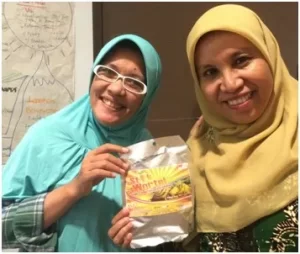
Pokja 6: cabbage and carrot scraps became a social enterprise initiative
In Makassar, we formed a core group of approximately 16 SILE members and community leaders and in Surabaya we formed a core group of approximately 10 SILE members and community leaders. These core group members undertook the 2 day foundational training and subsequently facilitated the successful 2 day community conversations, in their respective locations, supported by my shadow-facilitation.
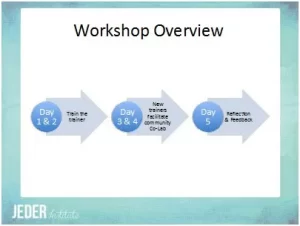
The Co-Lab training and implementation in Indonesia helped those already well versed in ABCD to feel confident and ready to take the project further after the funding was completed. The 5-day workshops offered the project leads and the community leaders the confidence in designing and facilitating a Co-Lab with community members and to also support community members to feel confident in utilising the processes themselves.
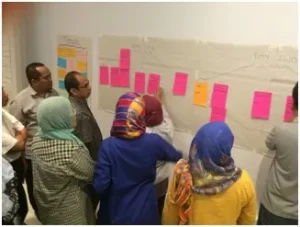
Newly trained facilitators co-designing the community conversation
Co-Lab participant feedback on the final reflection days sum up the success:
- I feel many change in my mind
- Satisfying – will use in school & community
- Great experience about how to arrange training planning
- Deepened my understanding of ABCD
- Enjoyed facilitation & sharing knowledge
- Discussion with Pokja was good
- Had learned theory & now deepened my practice
- I had another job to go to this week, I’m glad I chose to come here
- This week makes me realise there’s more to share
- Need to do this in community, not just talk about it in uni
- Feel really confident & able to transfer knowledge
- Can understand from theory to practice now
- People will be better at ABCD now – you came & strengthened us
- Now I have a responsibility to share these skills & knowledge
- I’m glad my groups came & learned to experience core group
- We all built capacity – we are all clearer on ABCD
- We have learned many new skills
- Happy to receive knowledge & share experience
- We had lots of fun!!!
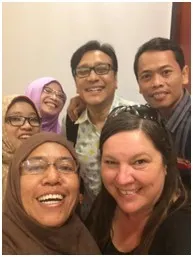
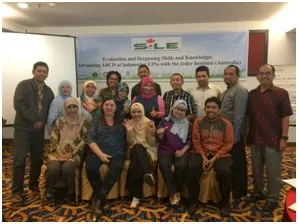
Surabaya Facilitators Makassar Facilitators
How are Co-Labs different?
The Co-Labs are emergent and respond according to the participants who are present. For example, the initial Co-Labs are organic in nature and respond to the challenges or ideas brought forward by the range of participants who are present. The initial members and core hosting team may be:
- Community connectors (active community members or ‘movers & shakers’)
- Service and/or agency representatives
- Local government community engagement/development officers
- Other identified interested parties
Once the initial group is trained, they are equipped to host a Co-Lab around any number of challenges or ideas. This could be demographically based such as a youth lab or multi-cultural lab or could be challenge based such as a school retention lab or a topic specific, National Disability Insurance Scheme (NDIS) lab. The Co-Lab training initially benefits the core members and the local organisational hosts but will unearth potential for the whole of community.
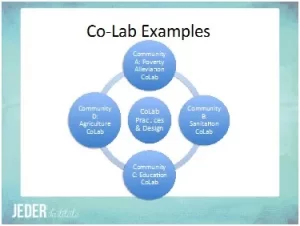
What will be different as a result of the Co-Labs?
Currently, community participation is often through consultation, community grants for activity-based programs and a number of other user-based processes.
The Co-Labs are aimed at broad community participation, apart from but including the usual suspects, which result in an embedded and sustainable approach for the future of the identified communities. Community members, in partnership with local services and agencies, will:
- Identify challenges and/or ideas for action, unique to their communities
- Strengthen relationships with other community members by engaging them in conversations that matter
- Develop strengths-focused, place-based initiatives based on the unique ideas which will emerge from each lab
Example: Lengkok Bahru, Indonesia
During November 2016, the South Central Community Family Service Centre (SCCFSC) in Singapore undertook Co-Lab training over 4 days with the 4th and final day deliberately landing on a Saturday to ensure community members could attend. The Co-Lab training was held for 3 days as there were participants who had not previously attended any ABCD training and SCCFSC decided to host the community day over one day only.
This training was different, in comparison to Indonesia where only the new facilitators were trained. In Singapore, we had a training group of 48 people from a variety of services show up! Of these 48, there were16 participants from SCCFSC who joined the participating community members for the community conversation day.
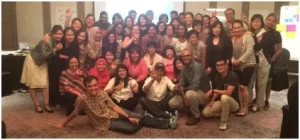
48 participants attended the Co-Lab training in Singapore
During the co-design process, we all decided that those who would be facilitating the community conversation day would be the active participants although; the other participants of the training could support them by offering suggestions and sharing ideas. In this way, the other participants at the training were still able to learn and understand the process in a practical and meaningful way. They co-designed both a whole community day plus designed what a 4 hour community session might look like.
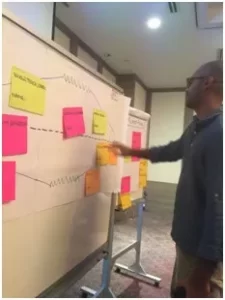
A pivotal part of the Co-Lab process is to put the design into practice as soon as possible to build confidence in the new processes and achieve quick wins! So, the next day, during the community conversation day, the newly trained Co-Lab facilitators were able to:
- Help shift thinking from a deficiency mindset to one of abundance
- Build on the already present strengths and assets of their community
- Increase their confidence in hosting participatory leadership processes
- Participate in a working social lab which offers real time opportunities to move ideas to action
Some of the outcomes for action, which emerged from the Lengkok Bahru community conversation day, were:
- Social events for weekends
- Safety of elders – loneliness, food and hygiene
- Safety of children – drugs issue, smoking
- Support for single mums
- Youth and kids not going to school and dropping out
- Family security and well-being
- Welcome to new neighbours
SCCFCS and their community partners now have the opportunity and the skills to create further Co-Labs or community conversations around these emergent themes.
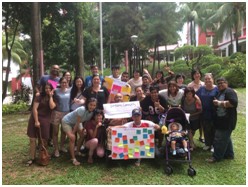
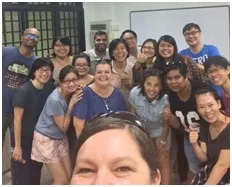
Lengkok Bahru Community Day SCCFSC Co-Lab Facilitators
How will this build, strengthen or enhance local participation?
The labs draw on the strengths, skills and abilities of community members to co-create:
- Community-led conversations
- A range of place-based specific approaches
- Ongoing peer-to-peer support and mentorship
- Local decision-making capacity
The Co-Labs key components also strengthen social capital by:
- Bonding: the initial training will be local community leaders who are committed to supporting change in their community. Subsequent citizen-led Co-Labs will bring people together around like-minded causes. Each lab will also integrate a “rearview” session each 3-6 months to check-in on progress, barriers or further support which may be required
- Bridging: Asset Mapping is an integral component of ABCD and the Co-Labs will encourage people to identify, connect and link local assets and strengths with a particular focus around an inclusive practice which identifies “who’s not around the table?”
- Linking: Through Asset Mapping and participatory leadership processes, local community and organisational assets and strengths are identified which will link to emerging ideas and be transformed into action through the collective participation of the Co-Lab participants
Through the Co-Labs, we are seeing skilled, empowered community lab facilitators who are undertaking broader consultation, increasing participation and creating low/no-cost initiatives. Community members are stepping up to assist in hosting local labs around conversations that matter and it is creating cross-generational, place-based initiatives and in our book, that’s awesome!






